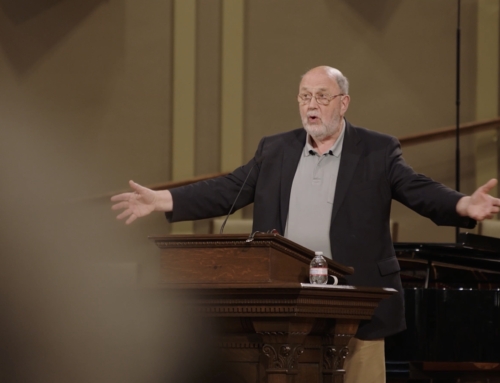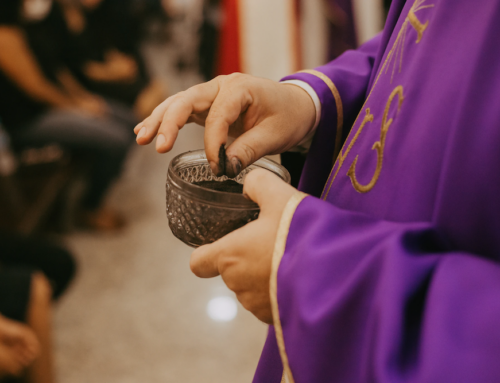There is a hope we find in the phrase ‘the promised land’. With Christian hindsight we now see that the ‘land’ is not a specific area of geography. Rather, the territory of the Kingdom of God—the ultimate promised land—is the heaven-on-earth space which Jesus now inhabits by the Spirit in and through the Church: you and me.
In 1941, my grandparents were fortunate to be able to acquire 160 acres of lake property in Northern Wisconsin. Their children and their grandchildren would be privileged to be able to learn more about God’s creation in nature by experiencing the ‘great outdoors’ up close and in person. To this day, my immediate family loves to be in the North Woods surrounded by the beauty of raw forests, idyllic lakes, and magnificent flora and fauna.
We humbly remember that not everyone in the world has this opportunity. To walk through the woods and smell the fresh air is delightful and enriching all by itself. But our family has also been able to dig deeper into the intricate connection between the environment and human creatures.
Occasionally, one of my cousins, a world-renowned botanist, will take us on walks through the mossy bogs and soft pine straw to explain what happens in the ecosystem. My cousin brings greater appreciation and joy through understanding the beauty and experience of being in that special place. His teaching has prompted me to reflect on how it is often through the death of one species that others receive life.
Knowledge and Joy
I’m thankful for hikes with my cousin because his depth of knowledge increases my own knowledge and brings deeper joy to my outdoor experiences. Just as I know it is a joy and privilege to experience the North Woods, he points out other joys in nature that might have escaped my attention. The same is true for knowledge of Christ.
The story of Jesus’ crucifixion is not just central to the Christian story—many would argue it is central to understanding Western history altogether. While there is value in knowing the facts of the Crucifixion or even the theological basics, there is great joy to be found in knowing the Kingdom-privileges we inherit as daughters and sons of Jesus Christ, our King.
Five Ways the Crucifixion of Jesus Brings Joy and Hope
Prof. N.T. Wright’s book, The Day the Revolution Began, and the course that goes along with it, illuminates how Jesus’ crucifixion brings joy and hope. You will see afresh what the early Christians understood: ‘By 6 p.m. on that dark Friday the world was a different place’.
Here are five aspects of the crucifixion on which we might reflect this Lenten season, which include several quotes from Prof. Wright’s book.
God is Faithful
When we understand our personal experience of redemption in light of the narrative of Israel’s story, it brings us a deeper appreciation of how God has been faithful to his people in the past. We find hope in knowing that through the death of Israel’s representative, Jesus, we have God’s affirmation of solidarity to be present with us in suffering. The cross is God’s promise—up close and in-person—to continue to be faithful.
Forgiveness is Concrete
As Christians, we have the beautiful gift of knowing and experiencing God’s forgiveness for our sins. Just knowing this is a wonderful, freeing experience. Yet, as we look to the cross and the crucifixion of Jesus of Nazareth, we reflect on the costly and concrete (physical) aspects of divine forgiveness.
‘Jesus died for our sins not so that we could sort out abstract ideas, but so that we, having been put right, could become part of God’s plan to put his whole world right. That is how the revolution works’.
Disarming False Notions
Some who teach about the Cross, as well as many who criticize the Church, make it sound like the crucifixion is the story of God punishing his own son. As we come to a deeper knowledge of the story, we realize that the Cross is about love, not punishment.
‘A new sort of power will be let loose upon the world, and it will be the power of self-giving love. This is the heart of the revolution that was launched on Good Friday. You cannot defeat the usual sort of power by the usual sort of means. If one force overcomes another, it is still “force” that wins. Rather, at the heart of the victory of God over all the powers of the world there lies self-giving love, which, in obedience to the ancient prophetic vocation, will give its life “as a ransom for many”’.
Atonement is Redefined
Central to conflict among different Christian groups is a varying understanding of what ‘atonement’ means. In a deeper study of the Crucifixion, the Cross is understood as it relates to the mercy seat in the Holy of Holies. God’s work of atonement is more vast and beautiful than we often teach.
‘Since sin, the consequence of idolatry, is what keeps humans in thrall to the nongods of the world, dealing with sin has a more profound effect than simply releasing humans to go to heaven. It releases humans from the grip of the idols, so they can worship the living God and be renewed according to his image’.
Listening to the Authors
In our desire for a simple, linear understanding of Scripture, it’s easy to lose the voice and intentions of its different authors. The gospel writers bring their own layers of interpretation to the story of Good Friday. We might not hear all of the nuances in a sermon or Sunday School. By studying the voice of the authors, we multiply our sense of joy and hope from understanding them.
‘Only when we give full early Christian weight to the phrase “in accordance with the Bible” will we discover the full early Christian meaning of the phrase “for our sins”’.
May you be encouraged to dig deeper into the meaning of Jesus’ crucifixion this Lenten season. May you find renewed joy in our ultimate hope that God will one day fully fill the land with his promises of Easter morning.
David P. Seemuth, PhD
Latest posts by David P. Seemuth, PhD (see all)
- Advent Reflections from the N.T. Wright Online Team - December 5, 2022
- YouTube as Public Reading of Scripture - August 29, 2022
- What I Learned From A Week With Professor Wright - June 16, 2022







